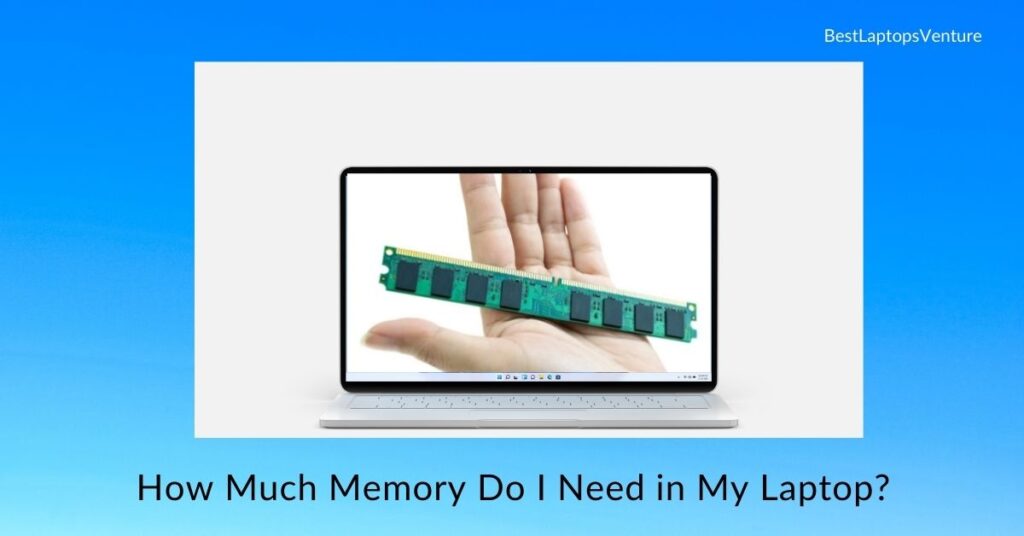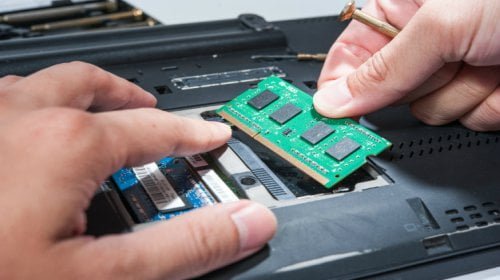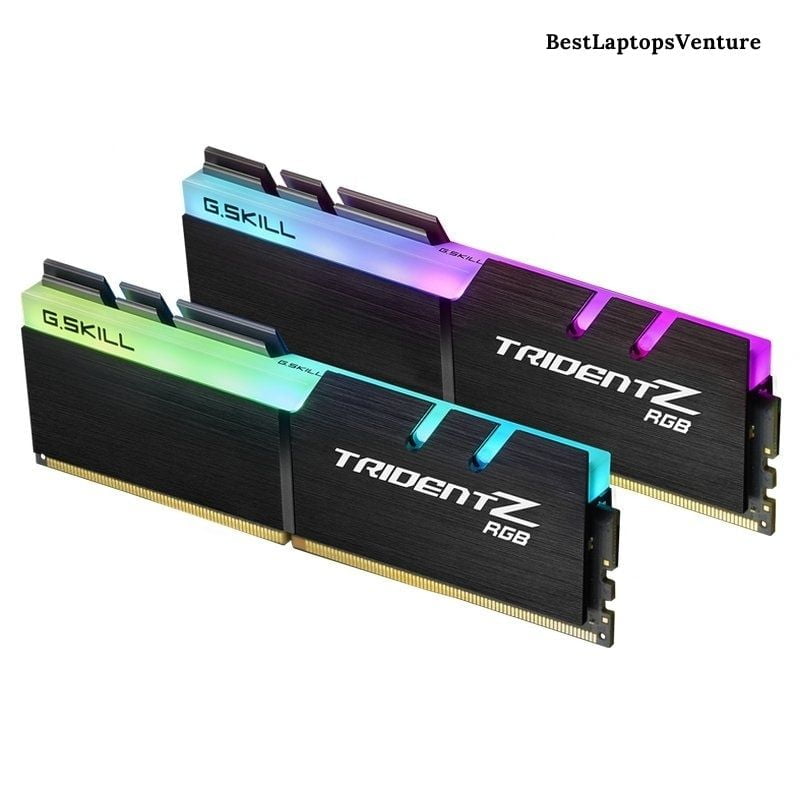
Random Access Memory, commonly abbreviated as RAM or simply “memory,” is a critical component of every computing device.
Memory is the computing world’s unsung hero. Computer makers are fond of bragging about the CPU’s performance, the display’s size, and resolution, or, more frequently in the case of laptops, the computer’s thinness.
To be sure, these are all critical specifications, but wise computer consumers also pay attention to a less-publicized spec: the amount of RAM in the system.
Why is this important, and how do you know which numbers to search for? Continue reading and we’ll inform you of all you need to know – and it won’t seem at all random.
What is Random Access Memory (RAM) and what does it accomplish for your computer?
At its most fundamental level, a computer is made up of three major components.
The CPU: The CPU is the component that does the computations.
The Hard Drive: The hard drive stores everything necessary for the CPU to function properly, including the operating system, applications, and data.
RAM, or random access memory, saves just the piece of data from the hard disk that the CPU need at any given time.
How much Memory / RAM do I require?
If you’re wondering, “How much memory do I require?” It’s critical to understand that the amount of RAM required for optimal performance is dependent on how you want to use your PC.
When it comes to RAM, there is no one-size-fits-all answer. It all comes down to the quantity of data storage required by your programs.
If all you need is a simple laptop for taking notes in class, writing and saving documents, and browsing the web, you won’t want much RAM.
However, if you’re planning to create the next best-selling software, process films, or compress huge files, your setup will require some substantial storage capacity.
Without sufficient RAM in your computer to collect and read data for sophisticated processing activities, your experience will be slow and difficult, and in certain situations, will result in a significant system crash due to overload.
4GB of laptop RAM should be enough for anyone searching for the fundamental essentials of computing. If you want your PC to do more demanding jobs like gaming, graphic design, and programming successfully, you need to have at least 8GB of laptop RAM.
For individuals looking to push the limits of a PC’s capabilities and simultaneously run numerous huge programs, 12GB RAM laptops, 16GB RAM laptops, 32GB RAM laptops, or even 64GB RAM laptops are all viable possibilities.
Outside of intensive data processing, you generally won’t require more than 8 to 12GB of laptop RAM if you’re a typical PC user.
Memory/RAM vs. Hard Disk
In some respects, the RAM and hard disk of a computer are comparable since both store data. Whereas a hard disk is optimized for reading and writing big chunks of data at a slow but consistent rate, RAM functions thousands of times quicker.
RAM is a critical component of your computer’s architecture. Without it, all of your data would be kept in an unimaginably sluggish location, making your computer similarly slow.
The more RAM you have, the more data you can store in this lightning-fast memory rather than on the much slower hard disk. In other words, more than any other component, RAM determines how “quick” your computer seems.
The more programs you have open at the same time, or the more computationally intensive those applications are, the more noticeable the performance difference in relation to the amount of RAM you have.
For instance, if you’re attempting to play a resource-intensive video game or edit an image using Illustrator or Photoshop, the less RAM you have, the slower your computer will run.
Additionally, there is a correlation between the quantity of memory you have and the amount of available hard drive space.
If your computer just has a tiny amount of RAM – say, 2GB – it will be required to read and write to the hard drive much more frequently, which will cause it to slow down.
If your hard drive has a small amount of empty space, such reads and writes will be slower since the CPU will have to spend more time juggling files to access them.
How much Memory/ RAM should laptops have?

The majority of laptops come with 8GB of RAM, but premium models come with 16GB — and even up to 32GB for the most powerful gaming laptops.
As previously said, tablet and laptop requirements are converging, but the majority of users choose to run more complicated programs on laptops, which implies RAM plays a larger role in this scenario.
For something like a Chromebook, which is primarily cloud-based and has limited storage, you won’t want much RAM and will be good with 8GB when purchasing one, especially now that you can utilize the Google Play Store to download Android apps straight to your computer.
However, for Windows and MacOS, you might consider beginning with 8GB and increasing it to 16 GB.
The majority of the finest laptops include 16GB for a reason. For example, Windows 10 utilizes around 2GB RAM before you ever run an application.
If you’re going to be doing a lot of graphic design work or dabbling in some higher-end gaming, you may want to bump it up to 16GB.
You’d only need to go beyond that if you’re editing large video or photo files – the sort of stuff you’d ordinarily do on a desktop.
While the majority of individuals do not use a laptop for such duties, if you do, purchasing sufficient RAM is critical.
It’s more difficult (or, in some modern models, impossible) to replace RAM on a laptop than it is on a desktop, thus purchasing the minimum amount of RAM is critical.
How much Memory / RAM do you require to play games?
16GB of RAM is the optimal starting point for a gaming PC. While 8GB was plenty for many years, modern AAA PC games such as Cyberpunk 2077 require 8GB of RAM, while up to 16GB is suggested.
Few games, even the most recent ones, will fully utilize 16GB of RAM. Rather than that, the additional capacity allows you to run other programs concurrently with your games.
16GB is plenty for the great majority of gamers. However, if you want to broadcast or run numerous apps concurrently with your games — OBS Studio, a web browser, for example — 32GB will provide you with a bit more space.
If you’re primarily interested in gaming, you won’t notice any performance difference between 16GB and 32GB, so emphasize purchasing fast RAM.
How much Memory am I now using?

If you’re not sure how much memory your computer has, finding out is simple. You can determine the amount of RAM installed on your computer by conducting an internet search for the model or serial number.
Alternatively, you can search your system for the required data. Here’s a basic rundown on how to determine this:
- Navigate to the starting menu on your computer.
- Navigate to “System Settings.”
- Perform a RAM search.
- Click “View RAM information.”
Following this step, you will be given a page detailing the RAM space available on your computer, how much is presently being utilized, and how much is available.
You may also discover information on your CPU here if you have any questions.
Which Memory configurations are compatible with my laptop?
The amount of RAM that may be installed on a laptop is regulated by the motherboard. What some people may not know is that RAM is a physical computer component, not a collection of instructions or software, and hence requires its own container.
The motherboard houses all of your computer’s critical components, including the CPU, RAM, and hard drive.
RAM is available in the form of physical strips. Each strip has a fixed amount of memory, ranging from 2GB to 32 GB.
The majority of laptop motherboards provide two to three RAM slots. If your laptop has 8GB of RAM, it is most likely equipped with two 4GB RAM modules installed in separate slots.
Due to the way memory is installed in your laptop or computer, it is fairly simple to remove and extend.
One of the most typical methods of upgrading your RAM is to replace your 4GB strips with 8GB strips, totaling 16 GB. Is 16GB of memory necessary?
Probably not, but the upgrade is rather affordable, and you’ll never have to worry about apps failing or your computer crashing as a result.
However, it’s critical to bear in mind that your computer’s motherboard may have a restriction on the amount of RAM that may be upgraded, so keep this in mind before attempting to upgrade.
While the majority of modern HP laptops are capable of accepting 16GB or more RAM, older versions may not. Conduct a study on the capabilities of your gadget before acquiring greater GB strips.
How to Select the Appropriate Memory/ RAM?

There are several types of RAM available, and only the kind indicated for your laptop will function, so exercise extreme caution while buying.
It’s not just about determining the quantity of RAM you require; it’s also about matching numerous critical specifications, including:
The three primary kinds of RAM are SRAM, DRAM, and SDRAM.
There are now five different types of data speeds available: SDR, DDR, DDR2, DDR3, and DDR4.
RAM speed is often mentioned after the data rate, e.g. DDR3-800. It specifies how quickly the CPU can access the RAM.
Module size and type: Memory modules for desktop computers and laptop computers might vary in physical size. DIMM (Dual Inline Memory Module) is frequently used in desktop laptops, but SO-DIMM is frequently used in laptop computers (Small Outline Dual Inline Memory Module).
Additionally, there may be variations in the number of pins (the tiny contacts on the bottom of the RAM)
If you’re unsure which module is appropriate for your machine, make an educated guess. You may verify this by contacting the manufacturer directly.
Typically, the support page for your individual model will contain the exact requirements you want. Alternatively, take your laptop to a nearby shop where a member of staff can assist you in making the correct pick.
How much Memory is sufficient?
You are the only one who knows how much RAM you require. Whether you’re in the market for a new PC or an upgrade to your current laptop, you should evaluate how you’ll use your computer and the amount of immediate memory it’ll require to stay up.
While average users may get by with entry-level RAM, it may not be sufficient for more complex programs.
In general, 8GB of RAM should provide sufficient processing power for all but the most intensive tasks, and if you find that you want more, expanding your storage space in tandem with your PC’s demands will not be difficult or expensive.
When confronted with doubt or insecurity, larger is always preferable. When comparing identical devices with varying RAM capacity, go for the bigger GB if your budget allows.
You’ll save the headache of subsequent upgrades and will have peace of mind knowing that your computer can stream, edit, play, and design without experiencing poor processing rates or annoying latency times.
Purchase the Required Memory/RAM
Purchasing a laptop with the appropriate amount of RAM is similar to purchasing a house or apartment – you should look for one that fulfills your long-term needs, not simply your present needs.
That’s because, similar to relocating, it might be a nuisance and an unexpected expenditure if you discover you require more than you have.
At the same time, there is little benefit to purchasing far more than you require. The difference between 8GB and 16GB is substantial, yet only a small percentage of users require additional memory.
Bear in mind that more RAM will only make your computer feel quicker if you really utilize it.
Finally, if you believe you have sufficient RAM but your computer feels slow, examine your hard drive.
A hard disk that is more than 75% full will begin to slow down operations. Eliminating unwanted files or moving them to an external device to make room for new ones may be the simplest update of all.
Read more: How much RAM do I need for gaming

![How Much Do Laptops Weigh? [11 Brands Looked At] 9 How Much Do Laptops Weigh](https://bestlaptopsventure.com/wp-content/uploads/2024/03/how-much-do-the-laptops-weigh-1024x536-1.jpg)
![9 Best Windows Laptops for Editing in July 2025 [Expert Recommended] 10 Best Windows Laptops for Editing](https://bestlaptopsventure.com/wp-content/uploads/2024/03/best-windows-laptops-for-editing.jpg)

![9 Best Laptops For Project Managers in July 2025 [Expert Recommended] 12 Best Laptop For Project Managers](https://bestlaptopsventure.com/wp-content/uploads/2024/04/best-laptop-for-project-managers.jpg)

![How to Take a Screenshot on an ASUS Laptop? [Easiest Ways] 14 How to Take a Screenshot on an ASUS Laptop](https://bestlaptopsventure.com/wp-content/uploads/2024/03/How-to-take-a-screenshot-on-an-asus-laptop.jpg)
![9 Best Laptops for SketchUp in July 2025 [Expert Recommended] 15 Best Laptops for SketchUp](https://bestlaptopsventure.com/wp-content/uploads/2024/03/best-laptops-for-sketchup.jpg)

![Why Are Gaming Laptops So Expensive? [10 Main Reasons] 17 Why Are Gaming Laptops So Expensive?](https://bestlaptopsventure.com/wp-content/uploads/2024/02/Why-are-gaming-laptops-so-expensive.jpg)
